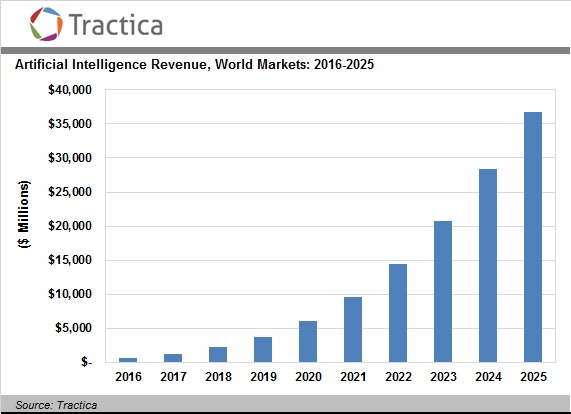“I believe that artificial intelligence is going to be our partner. If we misuse it, it will be at risk, if we use it right it can be our partner.” – Masayoshi Son, CEO, Softbank
Since Walmart acquired Flipkart for a whopping $ 20 billion, everyone is rushing to develop an eCommerce platform. The good news is that global eCommerce sales are expected to grow to $ 6 trillion by 2022.
Artificial Intelligence(AI) is leaving its footprint on every sector. Go anywhere today and you will find the adoption of AI in eCommerce. In fact, according to a recent survey, AI in eCommerce is booming at such a speed that the revenue of AI is expected to reach $ 36.8 Billion worldwide by 2025.

What is AI?
Artificial intelligence is a human developed skill for a computer program or a machine that allows them to think and learn. They work themselves without being encoded with commands. John McCarthy named this term “artificial intelligence” in 1955.
This technology has a great impact on our lives. From growing crops to food processing, from how we communicate to how we travel and do business – AI is contributing to our day-to-day life.
Global businesses found their safe haven in AI. After Google acquired DeepMind, an AI specialist in ML and algorithms – other IT big players such as Facebook, Microsoft are following the trend and showing keen interest in either exploring or acquiring startups in AI. Chasing this trend allows these enterprises to save millions of dollars and hours of productive time. A Ubisend report says that 40% of eCommerce visitors use AI chatbots to find offers and deals on site. The same report also mentions that 1 in 5 customers show willingness to buy from a chatbot.
How Does AI Benefit Businesses?
1) Decrease in Cart Abandonment
eCommerce sites are facing the biggest issue; an increased cart abandonment rate. With the help of AI, online shopping sites find a new way of conversion. The customers who abandon carts are a few taps away from buying products. By analyzing such customer data, the site owner can send automated emails with personalized content, which helps in making the sale and decrease cart abandonment rate gradually.
2) Customer-centric Search Results
Contextualized and personalized search is possible through AI and machine learning, which improve search results, through natural language processing and deep learning algorithms. AI offers more relevant and accurate results, so that customers always find what they are looking for.
An excellent example of an AI-based personalized search is the recently updated Pinterest and its Chrome extension. This allows users to select an object in any photograph online, and then ask Pinterest to show similar items using image recognition software. AI technology gives you an edge over competition and is available for developers and enterprises of any size and budget.

3) Better Target and Re-Target Customers
According to a survey, at least 33% of marketing leads are becoming dead due to lack of follow up. This means the onus of losing customers falls on the sales team.
With the integration of marketing automation and AI, businesses can collect data and track customer behavior before, during, and after the purchase. It can also track their demographics, feedback, preferences, and purchase history. With the help of this information, businesses can improve their customer targeting, and the sales team finds itself in the position to send dynamic ads and automated personalized marketing material to the customer with heightened chance of conversion.
Retargeting is a crucial factor to success in an eCommerce business. An eCommerce site can track their visitors and re-target them anywhere on the web. Online stores display ads to those visitors on different websites, search engines, and apps. Artificial intelligence helps them determine the best locations, times, and content formats to display.
4) Optimize Image and Voice Search
Voice search is becoming popular nowadays. It allows customers to search for products without typing text-based queries or need of any devices. AI analyzes voice searches and process results using ML algorithms. It figures out accurately what the customer is seeking. Gartner predicts the importance of voice assistants; it projects-30% of human interaction with machines will take place by voice commands. As more and more homes are equipped with voice-based devices. To reach such customers, eCommerce websites will have to integrate voice search in their existing system.
eBay uses image search with great success. Shoppers can share a picture of the products via social media, upload pic from phone, or paste image URL into the eBay search bar. After that, they get results that match the image. Incorporating AI uses color, shape, and size to determine products that best match the shared image.
5) Implement Virtual Personal Assistant
According to Statista, there are over 110 million virtual assistant users in the United States alone. Research shows that virtual personal assistant (VPA) has emerged as the most impactful AI voice tool for eCommerce. A VPA tirelessly assists customers, it uses NLP to understand human voice query and responds with necessary action. Let’s take the example of 1-800-Flowers in the US, which allows customers to send flowers to their dear ones via voice assistant.
This tool saves time and has left a profound impact on the buyer’s persona. It provides a creative opportunity for eCommerce retailers to take advantage.
6) Deploy Chatbot
Chatbot is one of the vital tools in customer service. The e-commerce sites now enable 24/7 support to their customers. Earlier, there was a limitation for customer support. According to a survey, more than 67% of consumers worldwide use a chatbot for customer support in the recent year. These bots are intelligent enough to understand all the issues which the visitors have to face. We can integrate this tool into shopping carts, online support, and order processes.
Several eCommerce sites incorporate chatbots to help the customer in making smart buying decisions. Online stores can’t afford to ignore Facebook Messenger chatbots through which customers can communicate with vendors and offer assistance in the buying process. Bot Burger is one of the best examples of Facebook Chatbot. It helps deliver burgers in Paris on Friday and Saturday nights between 9 pm and 5 am. Users can order burgers directly from Messenger without visiting any website.
Examples of AI in eCommerce and Retail
1) Amazon Go

Amazon is a leader in AI-based retail technology. Customers of Amazon can make voice-based payments via Amazon Echo device and its assistant Alexa. The company recently launched its first cashier-less grocery shop Amazon GO in Seattle. This offers customers a complete automated grocery shopping experience.
Shoppers check-in via Amazon app, then sensors throughout the store track which items customers put in their basket. If customers put back any product while shopping it automatically removes it from their shopping cart. After shopping, customers can just take their items and leave. No checkout lines, no cashiers. Amazon automatically charges customers when they leave the store.
2) eBay

eBay uses AI to help customers sell more. It provides custom advice and recommendations to improve delivery time, pricing, buyers-seller communication, and much more.
Recently eBay introduced AI-enabled functions like Find It On eBay and Image Search as well as eBay ShopBot, a shopping assistant on Facebook Messenger.
3) Alibaba

You can feel the essence of AI everywhere in Alibaba. It uses augmented reality mirrors and facial recognition payment in AliPay and has developed interactive in-store mobile phone games. Recently Alibaba introduced an AI-enabled content writing product that uses deep learning models and natural language processing and reportedly produced as many as 20,000 lines of content per second.
4) IBM Watson
Using AI, IBM’s Watson developed a platform which helps retail companies to create personalized shopping assistants. It uses real-time data that more accurately shows a customer’s buying behavior and current status.
Here’s an example of how IBM Watson’s recommendation works: North Face has integrated IBM Watson’s machine learning technology to “help you find the perfect backpack for your next journey.”
Shoppers answer a series of questions about what their future backpack will be used for — commuting, hiking, etc.
Final Verdict:
AI is here to stay!. This technology continues to leave an imprint on the eCommerce industry. With the advancement in AI, the human interaction in the eCommerce sales process decreases, and who knows in some days eCommerce stores may run themselves. With AI, eCommerce retailers enjoy more sales and better customer satisfaction.
Digital & Social Articles on Business 2 Community
(69)
Report Post







